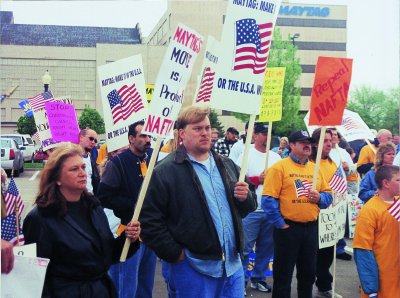|

Maytag workers in Galesburg, IL rally to protest the
closing of their
profitable plant. The work is going to notoriously anti-union
Reynosa,
Mexico. The workers demanded that Maytag CEO Ralph Hake
resign
and the jobs stay in the U.S.
The nation's trade deficit, the amount of goods produced
overseas and imported into the U.S., reached $435.2 billion last
year.
That record deficit, fueled by bad trade deals such as the North
American Free Trade Agreement (NAFTA) and the World Trade
Organization (WTO) indicates that North America's top export is
good-paying jobs, not products.
"The combination of record trade deficits and the highest U.S.
unemployment levels in two decades is no coincidence," said IAM
President Tom Buffenbarger. "The catalysts for these twin
disasters are the so-called free trade agreements, negotiated in
secret by and for transnational corporations."
North American consumers are buying the same products from the
same big corporations, but the factories and jobs went to other
countries.
Thousands of IAM members and their communities suffer as
companies like Eureka, Maytag, Stanley Works and other household
names move profitable manufacturing operations to low-wage
factories in China and Mexico.
Now those same "free traders" want to extend NAFTA to the whole
Western Hemisphere. The Free Trade Area of the Americas (FTAA)
is being hammered out in a series of meetings by trade
ministers. The final agreement is scheduled for completion in
2005.
Promoters are dusting off the same hollow promises of more jobs
and prosperity, but working families throughout the hemisphere
aren't buying it this time.
The FTAA meetings in Quito, Ecuador and Quebec, Canada saw
massive citizen protests. The next FTAA meeting is in Miami, FL
in November. Groups across North America are mobilizing to
demand that labor and environmental protections be part of the
core agreement.
"Over it's 10-year history, NAFTA cost workers in the United
States more than 700,000 jobs. Promised new markets have not
appeared. The small trade surplus the U.S. had with Mexico has
ballooned into a $30 billion annual deficit," said Buffenbarger.
"Extending this failed model to the entire hemisphere with FTAA
will be a disaster for working families.
"We need a new trade policy, one based on vision, fairness and
democracy. Workers in the U.S.-together with all the workers in
the Americas-deserve no less," Buffenbarger declared.
Global trade agreements must recognize core labor standards as
central trade issues. In NAFTA and the proposed FTAA, labor and
environmental protections are relegated to unenforceable side
agreements.
"Corporate America faces few obstacles in the export of our
jobs, capital and technology to low-wage developing countries.
Those nations often viciously suppress any attempts to form a
free trade union movement," Buffenbarger emphasized.
Without enforceable labor standards such as the right to join
unions or prohibitions against child labor, corporations can
plunder labor markets in any country. It's a race to the bottom
that no worker can win.
|
|